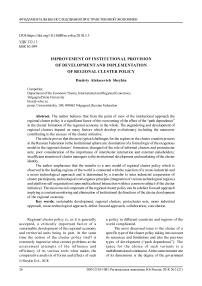Improvement of institutional provision of development and implementation of regional cluster policy
Автор: Sheykin Dmitriy Alekseevich
Журнал: Региональная экономика. Юг России @re-volsu
Рубрика: Фундаментальные исследования пространственной экономики
Статья в выпуске: 3 (21), 2018 года.
Бесплатный доступ
The author believes that from the point of view of the institutional approach the regional cluster policy is a significant factor of the overcoming of the effect of the “path dependence” in the cluster formation of the regional economy in the whole. The engendering and development of regional clusters depend on many factors which develop evolutionary including the maneuver contributing to the success of the cluster initiative. The article proves that the most typical challenges for the regions in the cluster creation process in the Russian Federation in the institutional sphere are: domination of a formal logic of the exogenous model in the regional clusters’ formation; disregard of the role of informal clusters and protocluster nets; poor consideration of the importance of intercluster interaction and external stakeholders; insufficient attention of cluster managers to the institutional development and marketing of the cluster identity. The author emphasizes that the transfer to a new model of regional cluster policy which is observed in the leading regions of the world is connected with the rejection of a mono industrial and a mono technological approach and is determined by a transfer to inter industrial cooperation of cluster participants, technological convergence principle (integration of various technological regions) and platform self organization (open multicultural interaction within a common subject of the cluster initiative)...
Sustainable development, regional clusters, protocluster nets, mono industrial approach, mono technological approach, defect focused approach, collaboration, coevolution
Короткий адрес: https://sciup.org/149131263
IDR: 149131263 | DOI: 10.15688/re.volsu.2018.3.3
Список литературы Improvement of institutional provision of development and implementation of regional cluster policy
- Bator F.M. The Anatomy of Market Failure. The Quarterly Journal of Economics, 1958, vol. 72, no. 3, pp. 351-379.
- Bejker B. Predislovie . Dinni K. Brending territorij. Luchshie mirovy’e praktiki . Мoscow, Mann, Ivanov and Ferber Publ., 2013, pp. 9-11.
- Benner M. Clusterpolitik -Wege zur Verknüpfung von Theorie und politischer Umsetzung. Berlin, LIT Verlag, 2012. 296 p.
- Carment D. Assessing State Failure: implications for theory and policy. Third World Quarterly, 2003, vol. 24, no. 3, pp. 407-427.
- Fornahl D., Henn S., Menzel M.-P., eds. Emerging Clusters: Theoretical, Empirical and Political Perspectives on the Initial Stage of Cluster Evolution. Northampton, Edward Elgar Publ., 2010. 384 р.
- Frolov D.P., Lavrent’eva A.V. «Iskusstvo vojny» s institucional’nymi anomaliyami: obzor osnovnyh metodov . Zhurnal ekonomicheskoj teorii , 2016, no. 3, pp. 138-152.
- Ghazinoory S., Narimani M., Tatina S. Neoclassical versus evolutionary economics in developing countries: convergence of policy implications. Journal of Evolutionary Economics, 2017, vol. 27, iss. 3, pp. 555-583 DOI: 10.1007/s00191-017-0490-z
- Ketels C., Lindqvist G., Sölvell О. Strengthening Clusters and Competitiveness in Europe: The Role of Cluster Organisations. European Cluster Observatory, Center for Strategy and Competitiveness, 2012. 50 р.
- Konstantynova А. Regional Cluster Policy and Economic Development -Case study of the Basque Country and Upper Austria. A Dissertation for the Degree «Doctor Rerum Politicarum» at Faculty for Economics and Social Policy, Catholic University EichstättIngolstadt. Ingolstadt, 2015. 470 р.
- Lehmann T., Benner M. Cluster Policy in the Light of Institutional Context -A Comparative Study of Transition Countries. Administrative Sciences, 2015, vol. 5, no. 4, pp. 188-212.
- Longhi С. Clusters and Collective Learning Networks: The Case of the Competitiveness Cluster "Secure Communicating Solutions" in the French Provence-Alpes-Côte d’Azur Region. GREDEG WP, no. 2015-28. 24 р. URL: http://www.gredeg.cnrs.fr/working-papers/GREDEG-WP-2015-28.pdf.
- Mahroum S. Black Swan Start-ups: Understanding the Rise of Successful Technology Business in Unlikely Places. New York, Palgrave Macmillan Publ., 2016. 254 p.
- Mitrofanova I.V., Mitrofanova I.A., Zhukov A.N., Starokozheva G.N. O drajverax regional’nogo razvitiya i «belyx slonax» megaproekta «Sochi 2014» . Regional’naya ekonomika: teoriya i praktika , 2014, no. 31, pp. 32-39.
- Muro M., Katz B. The New "Cluster Moment": How Regional Innovation Clusters Can Foster The Next Economy. Brookings, 2010. 59 р. URL: https://www.brookings.edu/wp-content/uploads/2016/06/0921_clusters_muro_katz.pdf.
- Nazarov V. Evolyuciya modelej federalizma -rossijskij i zarubezhny’j opyt . Ekonomicheskaya politika , 2007, no. 1, pp. 121-134.
- Oliveira J.A.P. de, ed. Upgrading Clusters and Small Enterprises in Developing Countries: Environmental, Labor, Innovation and Social Issues. London, Routledge Publ., 2016. 192 р.
- Polterovich V.M. Institucional’nye lovushki: est’ li vyhod? . Obshhestvennye nauki i sovremennost’ , 2004, no. 3, pp. 5-16.
- Schrammel T. Bridging the Institutional Void: An Analytical Concept to Develop Valuable Cluster Services. Management Revue, 2013, vol. 24, no. 2. Special Issue: Firm Clusters: Challenges for Management and Public Policy, pp. 114-132.
- Schrammel T. Clusters as an instrument to bridge institutional voids in transition economies: Lessons learned from Southeast Europe. Berlin, Springer Science & Business, 2014. 267 р.
- Stimson R.J., Stough R.R., Roberts B.H. Regional Economic Development: Analysis and Planning Strategy. 2nd ed. Berlin, Springer-Verlag, 2006. 452 р.
- Suxarev O.S. Predstavlenie o disfunkcii institutov i sistem: ishodnye polozheniya teorii . Investicii v Rossii , 2013, no. 12, pp. 15-23.
- Toth B.I. Changing Endogenous Development: the Territorial Capital. Journal of Economics and Business Research, 2011, vol. XVII, no. 2, pp. 137-151.
- Vazhenin S.G., Vazhenina I.S. Evolyuciya territorial’noj konkurencii i sotrudnichestva territorij . Zhurnal ekonomicheskoj teorii , 2017, no. 1, pp. 82-93.
- Wessner Ch.W., ed. Best Practice in State and Regional Innovation Initiatives: Competing in the 21st Century. Washington, DC, National Academy of Sciences, 2013. 240 р.


